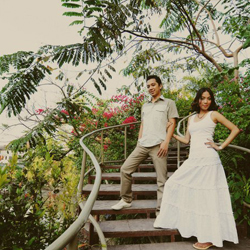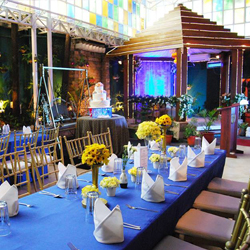Zamboanga del Norte – Twin City Province
As the name implies, Zamboanga del Norte has two cities, Dipolog and Dapitan, which are rich in history and culture. Dapitan is dubbed as the ‘Shrine Capital of the Philippines’ since this is where Philippine National Hero Dr. Jose P. Rizal stayed in exile and brought progressive changes in the city. Dipolog on the other hand is known as the ‘Orchid City’ since most households have this plant growing in their yard.
Here in Zamboanga del Norte, history, culture, and progress blend well together. Aside from cultural and historical landmarks, the province has started to show signs of progress and development brought about by the rise of tourism in the province. Soon, Zamboanga del Norte will become one of the prime destinations in the country.
Demographics
1. Population –
907, 238 (as of 2007 Census)
2. Land Area – 7, 301 sq. km
3. Capital – Dipolog City
4. Language/Dialect – Chavacano, Cebuano, English,
and Filipino
5. Divisions
Cities (2)
- Dapitan City
- Dipolog City
Municipalities (25)
- Leon B. Postigo (Bacungan)
- Baliguian
- Godod (17)
- Gutalac
- Jose Dalman (Ponot)
- Kalawit
- Katipunan
- La Libertad
- Labason
- Liloy
- Manukan
- Mutia
- Piñan (New Piñan)
- Polanco
- Pres. Manuel A. Roxas
- Rizal
- Salug
- Sergio Osmeña Sr.
- Siayan
- Sibuco
- Sibutad
- Sindangan
- Siocon
- Sirawai
- Tampilisan
Dapitan
Shrine/Rizal Shrine
Philippine National Hero Dr. Jose P. Rizal spent his
last four years in exile in Dapitan from 1982 –
1986. Here, he spent most of his time as a scientist,
physician, teacher, scholar and writer, artist, farmer
and even businessman.
Gloria de
Dapitan
It is a commercial business center which boasts of world-class
facilities such as amusement parks, bowling centers,
shopping centers, and theater.
Dakak Park
and Beach Resort
The very popular Dakak Beach is most known for its beautfiully
shaped cove and powdery white sand, and as a diving
mecca in Mindanao. Pristine blue waters, excellent dive
sites with an abundance of coral reefs, and a magnificent
sunset horizon characterize this tropical eden.
Cultural
Tulwanan
Village
Location: Sitio Tulwanan, Brgy. Lugdungan, Dilolog City,
Zamboanga del Norte
It was the original settlement of Dipolog's early inhabitants,
the Subanons. It is located about six kilometers from
the city proper and along Dipolog River, through which
the Subanons transported their products to trading posts
and markets in the early days.
Rizaliana
Museum
Location: Dapitan City, Zamboanga del Norte
It is a modern concrete building constructed in 1972,
which houses all Rizaliana books, periodicals, and other
historical exhibits. Part of it also serves as the office
of the Rizal Shrine curator.
Historical
Rizal Shrine
Location: Brgy. Talisay, Dapitan City, Zamboanga del
Norte
Dr. Jose P. Rizal’s more or less sixteen (16)
hectares estate has been declared a national shrine
and is being administered by the National Historical
Institute. By the year 2020, Dapitan is poised to become
the Dr. Jose Rizal Heritage Center of the Philippines,
owing to the wealth of Rizal memorabilia and memorable
places associated with the hero.
Dapitan
City Plaza
Location: Dapitan City, Zamboanga del Norte
Occupying an area of more or less one hectare (2.711
acres), the Dapitan City Plaza was developed and beautified
by Dr. Jose Rizal, the Philippines' National Hero, with
the assistance of Gov. Carcinero. His plan had been
to make it comparable to the plazas he had seen in Europe.
Relief Map
of Mindanao
Location: Dapitan City, Zamboanga del Norte
The area is more or less, 900 square meters in size.
Dr. Rizal made this map from August to September 1892
assisted by Francisco Paula de Sanchez, Rizal’s
favorite teacher in Ateneo de Manila. It was intended
as a motivating device for teaching geography and history
to his pupils in Dapitan.
Casa Redonda
Location: Dapitan City, Zamboanga del Norte
It is an octagonal dwelling that served as the quarters
for Dr. Jose Rizal's pupils. Later converted to a clinic,
it was here that George Tauter, the foster father of
Josephine Bracken, had his eye operation.
Casa Cuadrada
Location: Dapitan City, Zamboanga del Norte
It is the main house that served as the residence of
Dr. Jose Rizal together with members of his family,
who came to visit him every so often. It has been faithfully
reconstructed using its original light native materials.
Casa Real
Marker
Location: Dapitan City, Zamboanga del Norte
In this area stood the official residence and administration
building of Don Ricardo Carnicero, the politico-military
governor in Dapitan during the Spanish regime. The Casa
Real had a similar structure as the City Hall, except
that the Casa Real had three balconies: one in front,
one each in the left and right side. It was demolished
in the 1920’s to give way for the construction
of a medical personnel dormitory of the old Rizal Memorial
Hospital by the Americans.
Our Lady
of the Holy Rosary Cathedral
Location: Dipolog City, Zamboanga del Norte
Constructed by the Spanish friars sometime in 1894,
records show that the original altar was designed by
Dr. Jose Rizal, the sketch of the altar was patterned
after that of San Ignacio Church in Manila.
Monument
of Three Prominent Dipolognons
Location: Dipolog City Hall, Dipolog City, Zamboanga
del Norte
The monument features three Dipolognons who have made
a mark in the history of the province.
- Hon. Pascual T. Martinez - the first municipal mayor of Dipolog (1913-1918). He was later elected Municipal Mayor in 1918 following the First General Election of Dipolog and served until 1921.
- Rev. Fr. Nicasio Y. Patangan - First Filipino Diocesan Priest of Mindanao. Appointed Parish Priest of Dipolog in May 1940 and served the office until 1967.
- Eugenio R. Margate - He discovered the Margate System Of Planting Rice. Authored the book "Humay", 100 Kabanes Matag Hektarya." He was declared by Free Press as "Man Of The Year" in 1954. He served as Technical Assistant in the field of Agriculture during the Administration of Presidents Ramon Magsaysay and Carlos P. Garcia.
Filipino-Japanese
Memorial Marker
Location: Brgy Dicayas, Dipolog City, Zamboanga del
Norte
A World War II memorial stands over a battleground where
Filipino and Japanese soldiers clashed fiercely and
many lost their lives. The memorial is accessible in
15 minutes from the city proper via the highway.
Man-made
Gloria de
Dapitan
Location: Sunset Blvd., Dapitan City, Zamboanga del
Norte
Literally means “to bring glory to Dapitan,”
the commercial business center which boasts of world-class
facilities such as amusement parks, bowling centers,
shopping centers, and theater. Visitors can also buy
pasalubongs in the area.
Mi Retiro
Rock
Location: Dapitan City, Zamboanga del Norte
A naturally heart-shaped rock, it is so called because
it was where Dr. Jose Rizal had scribed the beautiful
verses of his poems, "Mi Retiro" and "Himno
a Talisay." It is also known as Batong Lumayag
as it appears to be afloat during high tide. Presently,
it lies within an artificial lagoon. A 500-seat open-air
amphitheater is located beyond Mi Retiro Rock
P’gsalabuk
Circle / Dipolog Fountain
Location: Estaka-Turno intersection, Dipolog City, Zamboanga
del Norte
The statutes represent the tri-people of Mindanao, which
symbolize the diverse cultures prevailing in Dipolog.
The bowl raised to heavens is a gesture of thanksgiving
and offering to God Almighty for the generous outpouring
of graces and blessings, bountiful harvests and sustained
peace and prosperity.
OISCA Children's
Forest Park
Location: Dipolog City, Zamboanga del Norte
Marvel at all of 64 hectares of lush forests, flora,
and fauna, giving trekkers and nature buffs an unforgettable
experience with nature at its best. A showcase of nature
conservation and ecological balance, the forest park
is a declared bird sanctuary that is home to exotic
birds. It is a joint project of the Japanese OISCA organization
and the city government of Dipolog.
Natural
Dakak Park
and Beach Resort
Location: Dipolog City, Zamboanga del Norte
Dakak Park and Beach Resort boasts 15 hectares of wooded
land, a natural reservoir for native plants and animals,
and a 750-meter private white-sand beach. Nestled on
the tip of Northern Zamboanga, Dakak faces the Sulu
Sea in the west and is surrounded by mountains on its
east side. Conveniently encircled by large island, Dakak
tactfully avoids the typhoon belt, making it the ideal
all-season destination. It also boasts of numerous dive
sites filled with coral reefs and diverse marine wildlife.
Sungkilaw
Falls
Location: Brgy. Diwan, Dipolog City, Zamboanga del Norte
Sungkilaw Falls is an amazing sight that many local
and foreign tourists really love to visit and explore.
It is described as an entirely new whitewater experience
where the sightseeing pleasure never wanes.
Sinilog
Island
Location: Brgy. Sinilog, Dapitan City, Zamboanga del
Norte
Its main attraction is its pure white sand, which can
hold its own against the other more well known spots
in the Philippines. In addition the island is surrounded
by crystal clear waters, making it the perfect site
for scuba diving.
Aliguay
Island
Location: Brgy. Aliguay, Dapitan City, Zamboanga del
Norte
Aliguay Island is enveloped by some of the clearest
and purest sands anywhere, and the waters around it
conceal some of the most interesting marine denizens
in Mindanao. This place is a must visit for lovers of
underwater marine life.
Cogon Eco-Tourism
Park
Location: Dipolog City – Polanco, Zamboanga del
Norte
This environmental rest area park and forest preserve
covers a total land area of 344 hectares. Within the
park's vast expanse also lies a 40-hectare natural forest
that is home to at least ten documented rare fauna species.
Just a few meters from the park's entrance is located
the Aviary, where visitors can catch a glimpse of exotic
birds endemic to the area.
Religious
Sta. Cruz
Marker
Location: Dipolog City, Zamboanga del Norte
Spot where migrating Boholanos from the Visayas landed
on and planted the cross of Christianity on May 3, 1905.
Mt. Linabo
Park
Location: Dipolog City, Zamboanga del Norte
A devotee has to climb 3,003 concrete steps towards
the 14 Stations of the Cross. The area is very popular
during the Lenten Season. It offers a spectacular view
of the twincities of Dipolog and Dapitan.
Our Lady
of Lourdes Grotto
Location: Dapitan City, Zamboanga del Norte
The vicinity of this grotto was also an ancient burial
ground of the pre-Spanish Dapitanons. The first church
in Dapitan built in 1631-1767 was at the left side of
the grotto and adjacent to it, was the Old Mission House.
St. James
Church
Location: Dapitan City, Zamboanga del Norte
Construcfed in 1871, the church was built in honor of
St. James the Greater, Dapitan’s parton saint.
A priceless heritage piped organ that bears a year marking
“1827” can be found at the choir loft. It
was brought to Dapitan in 1864 by the Augustinian Recollect
Father. It is a German made with European pipes and
a manual pump.
Our Lady
of the Most Holy Rosary Cathedral (Dipolog Church)
Location: Dipolog City, Zamboanga del Norte
Erected by the Spanish friars sometime in 1895, records
show that the original altar was designed by Dr. Jose
Rlzal, the sketch of the altar was patterned after that
of San Ignacio Church in Manila. Images of the Four
Evangelists, (St. Matthew, St. Mark, St. Luke, and St.
John) adorn the roof of the church. It can be seen on
the four columns supporting the apse
Hudyaka
Zanorte
Place: Zamboanga del Norte Province
Date: May 27 – June 7
Hudyaka is a Visayan term meaning joyful, vigorous,
cheerful, full of action, merrymaking and grand celebration.The
festival coincides with the 57th Founding Anniversary
of the province. It is s designed to promote Zamboanga
del Norte’s thriving tourism industry. Activities
include fashion show, beauty contest, sports events,
and cultural activities.
Buklog Festival
Place: Zamboanga del Norte
Date: April 16 - 20
Considered as the most significant of all Subanen religious
rituals, The buklog, which also stands for "ceremonial
platform," is a thanksgiving festival of the Subanen.
Buklog Festival is an ancient spiritual rite to offer
gratefulness, and to honor the spirits of the water
(malengma), the spirit of the forest (mamanwa), and
the spirit of the mountain (maninising palingkitan),
to whom they pray for abundant harvest and protection
from misfortune.
Kinabayo
Festival
Place: Dapitan City, Zamboanga del Norte
Date: July 24
Kinabayo is an exotic and colorful pageant re-enacting
the Spanish-Moorish wars, particularly the Battle of
Covadonga. In that battle the Spanish forces under General
Pelagio took their last stand against the Saracens.
They were able to reverse the tide of the war with the
miraculous apparition of Saint James, the Apostle. The
addition of local color and innovations has made this
annual festivity a popular attraction to visitors of
Dapitan.
Dr. Jose
Rizal Death Anniversary
Place: Dapitan City, Zamboanga del Norte
Date: December 30
Commemorative activities focus on Rizal's life, works,
and ideas are staged during his death anniversary. December
30 is observed nationwide as Rizal Day.
P’gsalabuk
Festival
Place: Dipolog City, Zamboanga del Norte
Date: Last Friday of May
It comes from the Subanen term which means “coming
together”. The festival aims to showcase the myriad
interplay of culture: Muslim, Lumad and the varied and
diverse culture of the settlers from all over the Philippines
as well as the Spanish, Chinese, American and other
Asian culture that have been so meticulously woven and
shaped into what is known as the unique Mindanao Tri-people
Culture.
By Air:
Daily flights are available from Manila to Dipolog,
landing at Dipolog City Airport. Travel time is
one hour and 30 minutes.
By Air-Land:
Local shipping companies travel from Manila to
Dipolog on a scheduled basis. Travel time is roughly
31 hours.






